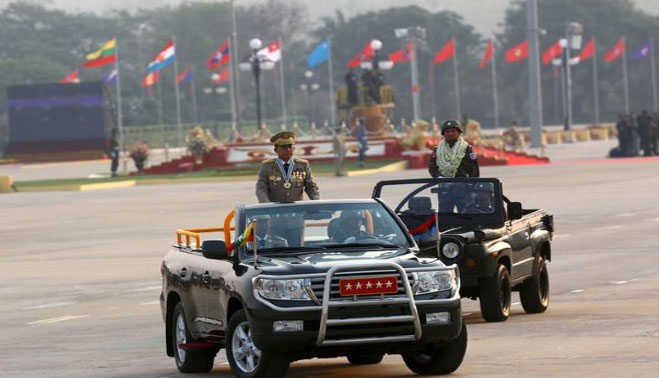![]() Home > Myanmar
Home > Myanmar
Burma Army Chief: Lack of ‘Obedience’ Could Create ‘Disorderly Democracy’

Commander-in-chief Min Aung Hlaing rides on a vehicle during a parade to mark Armed Forces Day in Burma’s capital, Naypyidaw, on March 27, 2016.
![]() March 28th, 2016 | 09:13 AM |
March 28th, 2016 | 09:13 AM | ![]() 3380 views
3380 views
RANGOON, MYANMAR
In a parade held in Naypyidaw to mark Burma’s 71st Armed Forces Day on Sunday, military commander-in-chief Snr-Gen Min Aung Hlaing highlighted the importance of the army’s role in the country’s political reforms and its continued collaboration with the incoming government.
“I would like to seriously say that we, the military, will cooperate to achieve success in working for the nation and the citizens’ interests,” he said in a speech ahead of the transfer of power to a largely civilian government by April 1.
Min Aung Hlaing said that the military would work with the incoming National League for Democracy (NLD) government, Parliament and the public in building “eternal peace” and advancing the country’s development.
“The military will protect the country, guard the public and assist in the government’s operations for the country’s development,” he said. “The country’s stability is important and we must also build national reconciliation and peace.”
Following a coup in 1962, a military junta ruled Burma for more than five decades, contributing to the country’s status as one of the most impoverished and underdeveloped in the region. Burma is home to one of the world’s longest running civil wars, with many ethnic nationalities engaged in armed struggle against the government, demanding greater self-determination and an end to the Burmese military’s abuses in their areas.
Political opposition was also long suppressed, with parties banned and NLD chairwoman Aung San Suu Kyi placed under house arrest for a total of 15 years. She is still barred from the presidency.
Many in Burma are now placing their hopes for democratic change in the new NLD administration, which opposed the military dictatorship for more than two decades.
But critics remain concerned by a continued military presence in Burma’s political scene, as well as what they see as collaboration between the new government and the armed forces. Under the country’s military-drafted 2008 Constitution, 25 percent of parliamentary seats are reserved for army representatives, which allows them veto power over any constitutional amendments. The armed forces also have retained control over three important ministries: Home Affairs, Defense and Border Affairs.
Yet Min Aung Hlaing described the current Constitution as “guarding the country’s national interests” during his speech at the Armed Forces Day parade, and indicated that the army would continue to be at the forefront of Burma’s affairs.
“We, the military, play a leading role in national politics,” he said.
Min Aung Hlaing told attendees—which included active and retired soldiers—that he would not allow Burma to “totter backwards” into “a situation which could harm the stability, perpetuation of sovereignty and non-disintegration of the Union.” He also vowed to form a “professional army” which could compare favorably to others in the region.
“The two main obstructions in our country’s progress toward democracy are weakness in obeying rules, regulations and laws, and having armed insurgents. This could lead to disorderly democracy. If we can only fix these two [things], the country’s path to democracy will be smooth,” he said.
Armed Forces Day commemorates the day when Aung San Suu Kyi’s father, Aung San, took up arms against Japanese occupying forces in Burma on March 27, 1945, during World War II. Originally, the occasion was marked as “Anti-Fascist Resistance Day,” which the Burmese government changed to Armed Forces Day in 1955. The NLD continues to acknowledge the date as Resistance Day.
Source:
courtesy of THE IRRAWADDY
by San Yamin Aung
If you have any stories or news that you would like to share with the global online community, please feel free to share it with us by contacting us directly at [email protected]